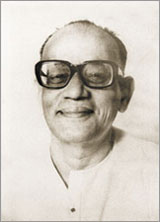A Quote by Prabhat Ranjan Sarkar
He himself will go into the drain and take his boy in his own lap. He will clean his dress, clean his clothes, clean his body; and afterward he will say, "My boy, you should walk carefully."
Related Quotes
The boy will remain a son and never become a father. He will be forgotten by the crowd once his blood is rinsed clean from the ground; his sister will think of him but soon she will forget him, too. He will live on only in Han's memory, a child punished not for his own insincerity but someone else's disbelief.
When the father dies, he writes, the son becomes his own father and his own son. He looks at is son and sees himself in the face of the boy. He imagines what the boy sees when he looks at him and finds himself becoming his own father. Inexplicably, he is moved by this. It is not just the sight of the boy that moves him, not even the thought of standing inside his father, but what he sees in the boy of his own vanished past. It is a nostalgia for his own life that he feels, perhaps, a memory of his own boyhood as a son to his father.
The love of dress is very marked in this attractive animal; he is proud of the lustre of his coat, and cannot endure that a hair of it shall lie the wrong way. When the cat has eaten, he passes his tongue several times over both sides of his jaws, and his whiskers, in order to clean them thoroughly; he keeps his coat clean with a prickly tongue which fulfills the office of the curry-comb.
Who will cry for the little boy, lost and all alone?
Who will cry for the little boy, abandoned without his own?
Who will cry for the little boy? He cried himself to sleep.
Who will cry for the little boy? He never had for keeps.
Who will cry for the little boy? He walked the burning sand.
Who will cry for the little boy? The boy inside the man.
Who will cry for the little boy? Who knows well hurt and pain.
Who will cry for the little boy? He died and died again.
Who will cry for the little boy? A good boy he tried to be.
Who will cry for the little boy, who cries inside of me?
The Little Mute Boy The little boy was looking for his voice. (The king of the crickets had it.) In a drop of water the little boy was looking for his voice. I do not want it for speaking with; I will make a ring of it so that he may wear my silence on his little finger In a drop of water the little boy was looking for his voice. (The captive voice, far away, put on a cricket's clothes.) Translated by William S. Merwin
No man, however enslaved to his appetites, or hurried by his passions, can, while he preserves his intellects unimpaired, please himself with promoting the corruption of others. He whose merit has enlarged his influence would surely wish to exert it for the benefit of mankind. Yet such will be the effect of his reputation, while he suffers himself to indulge in any favourite fault, that they who have no hope to reach his excellence will catch at his failings, and his virtues will be cited to justify the copiers of his vices.
When Christ was about to leave the world, He made His will. His soul He committed to His father; His body He bequeathed to Joseph to be decently interred; His clothes fell to the soldiers; His mother He left to the care of John; but what should He leave to His poor disciples that had left all for Him? Silver and gold He had none; but He left them that which was infinitely better, His peace.
Just because a man is dressed in a clean white robe does not mean his heart and hands are clean. Any man who neglects his conscience is a dangerous animal. Never judge a man by his image. Images can be bought or produced by any Hollywood producer, marketing team or fleet of stylists. Even kids know how to wear amazing costumes for Halloween. Always judge a man by the coloring of his heart and only his heart. Truth can be found in his record of actions, not intentions.
Christmas begins what Easter celebrates. The child in the cradle became the king on the cross. And because he did, there are no marks on my record. Just grace. His offer has no fine print. He didn't tell me, "Clean up before you come in." He offered, "Come in, and I'll clean you up." It's not my grip on him that matters but his grip on me. And his grip is sure. So is his presence in my life.






































